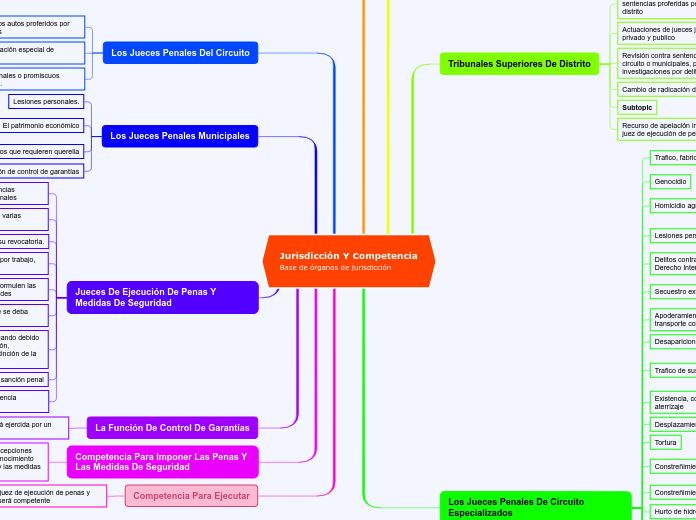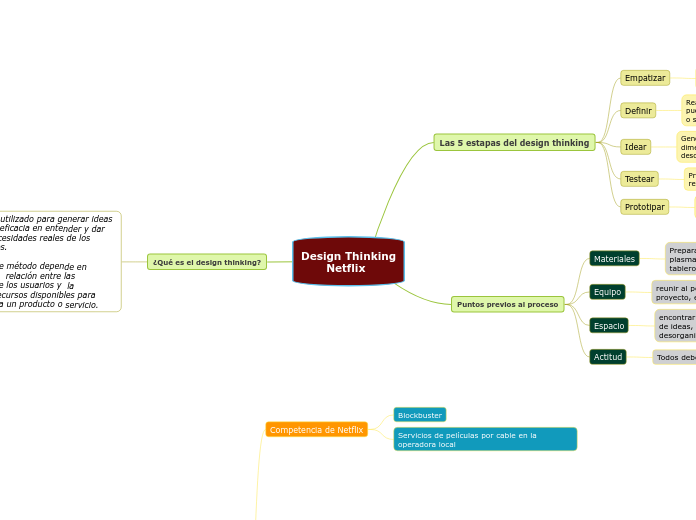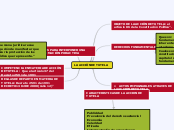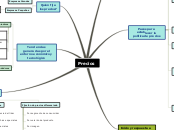Jurisdicción Y Competencia
Base de órganos de jurisdicción
The part of speech is a category to which a word is assigned according to its syntactic functions. In English the main parts of speech are noun, pronoun, adjective, determiner, verb, adverb, preposition, conjunction, and interjection.
Competencia Para Ejecutar
A preposition is one of the most exciting parts of grammar. A preposition is used to describe the location of something in relation to something else.
Ejecutoriado el fallo, el juez de ejecución de penas y medidas de seguridad será competente
Participle preposition consists of words that end in “ing”.
Competencia Para Imponer Las Penas Y Las Medidas De Seguridad
An interjection is used to express emotion in a sentence.
Think of other interjections!
Anunciado el sentido del fallo, salvo las excepciones establecidas en este código, el juez del conocimiento será competente para imponer las penas y las medidas de seguridad
La Función De Control De Garantías
An adverb is used to describe a verb, but it can also describe an adjective or another adverb.
Adverbs normally help paint a fuller picture by describing how something happens.
Función de control de garantías será ejercida por un juez penal municipal
Jueces De Ejecución De Penas Y Medidas De Seguridad
A numeral is a word or phrase that describes a numerical quantity.
Some theories of grammar use the word 'numeral' to refer to cardinal numbers that act as a determiner to specify the quantity of a noun, for example the 'two' in 'two hats'.
Reconocimiento de la ineficacia de la sentencia condenatoria
Inexequible o haya perdido su vigencia
La extinción de la sanción penal
Aplicación del principio de favorabilidad cuando debido a una ley posterior hubiere lugar a reducción, modificación, sustitución, suspensión o extinción de la sanción penal.
Verificación del lugar y condiciones en que se deba cumplir la pena o la medida de seguridad.
Aprobación previa de las propuestas que formulen las autoridades penitenciarias o de las solicitudes
La rebaja de la pena y redención de pena por trabajo, estudio o enseñanza.
La libertad condicional y su revocatoria.
Acumulación jurídica de penas en caso de varias sentencias condenatorias
Decisiones necesarias para que las sentencias ejecutoriadas que impongan sanciones penales
Los Jueces Penales De Circuito Especializados
A pronoun is a word that can be used in place of a noun, typically after the noun itself has already been stated.
Plantaciones ilícitas
Exceda de 8.000 unidades o la de semillas sobrepasen los 10.000 gramos.
Destinación ilícita de muebles o inmuebles
Inducción al empleo, producción y transferencia de minas antipersonales
Corrupción de alimentos, productos médicos o material profiláctico con fines terroristas.
Minas anti personales
Fabricación, importación, trafico, posesión y uso de armas químicas, biológicas y nucleares
Lanzamiento de sustancias u objetos peligrosos con fines terroristas
Instigación a delinquir con fines terroristas
Inciso 2º del artículo 348 del Código Penal.
Administración de recursos relacionados con actividades terroristas
Terrorismo
Entrenamiento para actividades ilícitas.
Concierto para delinquir agravado
Inciso 2º del artículo 340 del Código Penal.
Enriquecimiento ilícito de particulares
Testaferrato
Cuantía sea o exceda de cien salarios mínimos legales
Lavado de activos
Sea o exceda de cien salarios mínimos legales
Extorsión
Cuantía superior a quinientos salarios mínimos legales
Hurto de hidrocarburos o sus derivados
Constreñimiento para delinquir agravado
1 del artículo 185 del Código Penal.
Constreñimiento ilegal agravado
Numeral 1 del artículo 183 del Código Penal.
Tortura
Relative pronouns are used to add more information to a sentence. Which, that, who (including whom and whose), and where are all relative pronouns.
Desplazamiento forzado
Unlike demonstrative pronouns, which point out specific items, indefinite pronouns are used for non-specific things. This is the largest group of pronouns. All, some, any, several, anyone, nobody, each, both, few, either, none, one, and no one are the most common.
Existencia, construcción y utilización ilegal de pistas de aterrizaje
Trafico de sustancias
Cuando su cantidad supere los cien (100) kilos o los cien (100) litros en caso de ser líquidos
Desaparicion forzada
Apoderamiento de aeronaves, naves o medio de transporte colectivo
Interrogative pronouns are used in questions. Although they are classified as pronouns, it is not easy to see how they replace nouns. Who, which, what, where, and how are all interrogative pronouns.
Secuestro extorsivo o agravado
Reciprocal pronouns are used for actions or feelings that are reciprocated. The reciprocal pronouns are each other and one another.
Numerales 6, 7, 11 y 16 del artículo 170 del Código Penal.
Delitos contra personas y bienes protegidos por el Derecho Internacional Humanitario.
A reflexive pronoun ends with ...self or ...selves and refers to another noun or pronoun in the sentence (usually the subject of the sentence). The reflexive pronouns are myself, yourself, herself, himself, itself, ourselves, yourselves, and themselves.
Lesiones personales agravadas
Demonstrative pronouns are used to demonstrate (or indicate). This, that, these, and those are all demonstrative pronouns.
Numerales 8, 9 y 10 del artículo 104 del Código Penal.
Homicidio agravado
Possessive pronouns are used to show possession. The possessive pronouns are mine, yours, his, hers, ours, and theirs.
Numerales 8, 9 y 10 del artículo 104 de l Código Penal.
Genocidio
The personal pronouns are I, you, he, she, it, we, they. More often than not (but certainly not always), they replace nouns representing people.
Trafico, fabricación y porte de estupefacientes
Agravados según el numeral 3 del artículo 384 del mismo código.
Tribunales Superiores De Distrito
An adjective is a word that's used to describe a specific noun and to provide more detail to the listener.
Recurso de apelación interpuesto contra la decisión del juez de ejecución de penas.
Subtopic
Cambio de radicación dentro del mismo distrito
Revisión contra sentencias proferidas por los jueces de circuito o municipales, preclusiones proferidas en investigaciones por delitos de su competencia.
Actuaciones de jueces juzgamiento especial, derecho privado y publico
Superlative adjectives demonstrate a higher level of comparison between entities.
Primera instancia
Apelación autos y sentencias jueces de circuito, sentencias proferidas por los municipales del mismo distrito
Expresses a comparison between two entities or groups of entities in quality or degree.
Tribunales Superiores De Distrito, Jueces Penales De Circuito Especializados
A noun is defined as a person, place, thing or idea. Proper nouns always begin with a capital letter. Common nouns, which are general words, such as 'cars,' are not capitalized.
Apelación interpuesta en contra de la decisión del juez
Decisión condenatoria
Cambio de radicacion en el mismo distrito
Compound nouns are words where two nouns have been stuck together to make a new noun. Compound nouns should be written as one word, without a hyphen.
Revisión de sentencias de jueces penales especializados y precluciones proferidas en delitos de su competencia
A noun which refers to a group of things/people.
Procesos que lleven jueces penales de circuito especializados y fiscales delegados por juzgados penales especializados por delitos que cometan
Countable nouns are nouns that can be counted, even if the number might be extraordinarily high.
Uncountable nouns are nouns that come in a state or quantity which is impossible to count; liquids are uncountable, as are things which act
like liquids.
En Primera Instancia
Apelaciones de autos y sentencias en primera instancia
Proper nouns are the names of specific people or places. They should always begin with a capital letter.
De La Corte Suprema De Justicia
A verb is an action word or 'doing' word that signifies movement in some way.
Juzgamiento especial
Cambio de radicacion de procesos penales de un distrito a otro
Investigación y juzgamiento a senadores y representantes
Juzgamientos de funcinarios
Articulo 235 constitución política
Juzgamiento de los funcionarios
An auxiliary verb helps the main (full) verb and is also called a 'helping verb.' With auxiliary verbs, you can write sentences in different tenses, moods, or voices.
Artículos 174 y 235 Constitución política
Aforados constitucionales y legales
A participle is a verb form that can be used as an adjective or to create a verb tense. There are two types of participles: Present participle (ending -ing) and Past participle (usually ending -ed, -d, -t, -en, or -n).
Recursos de apelación de autos y sentencias en primera instancia
A modal is a type of auxiliary (helping) verb that is used to express: ability, possibility, permission or obligation. The main modal verbs in the English language are: can, could, may, might, must, shall, should, will, would.
Tribunales superiores
De revisión de sentencia en única o segunda instancia
A linking verb connects the subject with a word that gives information about the subject, such as a condition or relationship.
De casación
A verb with its own meaning: a verb that is not an auxiliary verb.
Los Jueces Penales Municipales
An article is a word used to modify a noun, which is a person, place, object, or idea. Technically, an article is an adjective, which is any word that modifies a noun.
Función de control de garantías
Procesos por delitos que requieren querella
Indefinite articles are the words 'a' and 'an.' Each of these articles is used to refer to a noun, but the noun being referred to is not a specific person, place, object, or idea. It can be any noun from a group of nouns.
Sujeto pasivo sea un menor de edad
El patrimonio económico
Cuantía equivalente a una cantidad no superior en pesos en ciento cincuenta
Lesiones personales.
It refers directly to a specific noun or groups of nouns.
Los Jueces Penales Del Circuito
A conjunction is a word like 'if' 'but' or 'and' which is used to connect sentences or clauses together.
Competencia de los jueces penales o promiscuos municipales del mismo circuito.
Procesos que no tengan asignación especial de competencia
Subordinating conjunctions are conjunctions that are used at the beginning of subordinate clauses. Some examples of these conjunctions are: although, after, before, because, how, if, once, since, so that, until, unless, when etc.
Recurso de apelación contra los autos proferidos por los jueces penales municipales
Coordinating conjunctions always connect phrases, words, and clauses. They are: for, and, nor, but, or, yet, so.









